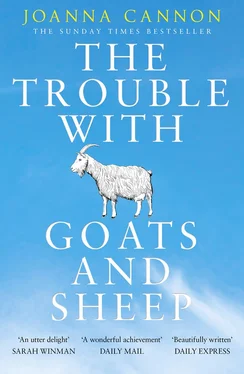We walked in silence down the avenue, until we reached the main road. We were side by side, although Tilly had to take more steps to keep up.
‘Who lives at number eight?’ she said, as we waited for the traffic.
‘Mrs Creasy.’
I whispered, in case Mr Creasy had extended his search.
‘I liked Mrs Creasy. She was teaching me to knit. We did like her, Grace, didn’t we?’
‘Oh yes,’ I said, ‘very much.’
We crossed the road opposite the alley next to Woolworth’s. It wasn’t yet nine o’clock, but the pavements were dusty hot, and I could feel material stick to the bones in my back. People drove their cars with the windows down, and fragments of music littered the street. When Tilly stopped to change her school bag to the other shoulder, I stared into the shop window. It was filled with stainless-steel pans.
‘Who murdered her?’ A hundred Tillys spoke to me from the display.
‘No one knows.’
‘Where were the police?’
I watched Tilly speak through the saucepans. ‘I expect they’ll be along later,’ I said, ‘they’re probably very busy.’
We climbed the cobbles in sandals which flapped on the stones and made us sound like an army of feet. In winter ice, we clung to the rail and to each other, but now the alley stretched before us, a riverbed of crisp packets and thirsty weeds, and floury soil which dirtied our toes.
‘Why are you wearing a jumper?’ I said.
Tilly always wore a jumper. Even in scorched heat, she would pull it over her fists and make gloves from the sleeves. Her face was magnolia, like the walls in our living room, and sweat had pulled slippery, brown curls on to her forehead.
‘My mother says I can’t afford to catch anything.’
‘When is she going to stop worrying?’ It made me angry, and I didn’t know why, which made me even angrier, and my sandals became very loud.
‘I doubt she ever will,’ said Tilly, ‘I think it’s because there’s only one of her. She has to do twice the worrying, to keep up with everyone else.’
‘It’s not going to happen again.’ I stopped and lifted the bag from her shoulder. ‘You can take your jumper off. It’s safe now.’
She stared at me. It was difficult to see Tilly’s thoughts. Her eyes hid behind thick, dark-rimmed glasses and the rest of her gave very little away.
‘Okay,’ she said, and took off her glasses. She pulled the jumper over her head, and when she appeared on the other side of the wool, her face was red and blotchy. She handed me the jumper, and I turned it the right way, like my mother did, and folded it over my arm.
‘See,’ I said, ‘it’s perfectly safe. Nothing will happen to you. I won’t allow it.’
The jumper smelt of linctus and unfamiliar soap. I carried it all the way to school, where we dissolved into a spill of other children.
*
I have known Tilly Albert for a fifth of my life.
She arrived two summers ago in the back of a large, white van, and they unloaded her along with a sideboard and three easy chairs. I watched from Mrs Morton’s kitchen, whilst I ate a cheese scone and listened to a weather forecast for the Norfolk Broads. We didn’t live on the Norfolk Broads, but Mrs Morton had been there on holiday, and she liked to keep in touch.
Mrs Morton was sitting with me.
Will you just sit with Grace while I have a little lie-down , my mother would say, although Mrs Morton didn’t sit very much at all, she dusted and baked and looked through windows instead. My mother spent most of 1974 having a little lie-down, and so I sat with Mrs Morton quite a lot.
I stared at the white van. ‘Who’s that then?’ I said, through a mouthful of scone.
Mrs Morton pressed on the lace curtain, which hung halfway down the window on a piece of wire. It dipped in the middle, exhausted from all the pressing. ‘That’ll be the new lot,’ she said.
‘Who are the new lot?’
‘I don’t know.’ She dipped the lace down a little further. ‘But I don’t see a man, do you?’
I peered over the lace. There were two men, but they wore overalls and were busy. The girl who had appeared from the back of the van continued to stand on the pavement. She was small and round and very pale, like a giant white pebble, and was buttoned into a raincoat right up to her neck, even though we hadn’t had rain for three weeks. She pulled a face, as though she were about to cry, and then leant forwards and was sick all over her shoes.
‘Disgusting,’ I said, and took another scone.
*
By four o’clock, she was next to me at the kitchen table.
I had fetched her over because she had sat on the wall outside her house, looking as though she’d been misplaced. Mrs Morton got the Dandelion and Burdock out, and a new packet of Penguins. I didn’t know then that Tilly didn’t like eating in front of people, and she held on to the bar of chocolate until it leaked between her fingers.
Mrs Morton spat on a tissue and wiped Tilly’s hands, even though there was a tap three feet away. Tilly bit her lip and looked out of the window.
‘Who are you looking for?’ I said.
‘My mother.’ Tilly turned back and stared at Mrs Morton, who was spitting again. ‘I just wanted to check she’s not watching.’
‘You’re not looking for your father?’ said Mrs Morton, who was nothing if not an opportunist.
‘I wouldn’t know where to look.’ Tilly wiped her hands very discreetly on her skirt. ‘I think he lives in Bristol.’
‘Bristol?’ Mrs Morton put the tissue back into her cardigan sleeve. ‘I have a cousin who lives in Bristol.’
‘Actually, I think it might be Bournemouth,’ said Tilly.
‘Oh,’ Mrs Morton frowned, ‘I don’t know anyone who lives there.’
‘No,’ Tilly said, ‘neither do I.’
*
We spent our summer holiday at Mrs Morton’s kitchen table. After a while, Tilly became comfortable enough to eat with us. She would spoon mashed potato into her mouth very slowly, and steal peas as we squeezed them from their shells, sitting over sheets of newspaper on the front-room carpet.
‘Don’t you want a Penguin or a Club?’ Mrs Morton was always trying to force chocolate on to us. She had a tin-full in the pantry and no children of her own. The pantry was cavernous and heaved with custard creams and fingers of fudge, and I often had wild fantasies in which I would find myself trapped in there overnight and be forced to gorge myself to death on Angel Delight.
‘No, thank you,’ Tilly said through a very small mouth, as if she were afraid that Mrs Morton might sneak something in there when no one was looking. ‘My mother said I shouldn’t eat chocolate.’
‘She must eat something,’ Mrs Morton said later, as we watched Tilly disappear behind her front door, ‘she’s like a little barrel.’
*
Mrs Creasy was still missing on Tuesday, and she was even more missing on Wednesday, when she’d arranged to sell raffle tickets for the British Legion. By Thursday, her name was being passed over garden fences and threaded along the queue at shop counters.
What about Margaret Creasy, then? someone would say. And it was like firing a starting pistol.
My father spent his time stored away in an office on the other side of the town, and always had to have the day explained to him when he got home. Yet each evening, my mother still asked my father if he had heard any news about Mrs Creasy, and each evening he would sigh from the bottom of his lungs, shake his head, and go and sit with a bottle of pale ale and Kenneth Kendall.
*
On Saturday morning, Tilly and I sat on the wall outside my house and swung our legs like pendulums against the bricks. We stared over at the Creasys’ house. The front door was ajar, and all the windows were open, as if to make it easier for Mrs Creasy to find her way back inside. Mr Creasy was in his garage, pulling boxes from towers of cardboard, and examining their contents one by one.
Читать дальше












